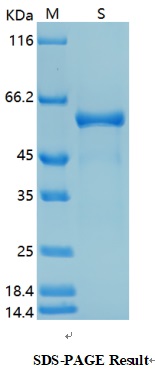Product Name :
CD105 Recombinant Protein Swiss-Prot :
P17813 Host :
E.coli Tag :
≥0.5mg/ml Amino acid Sequence :
ETVHCDLQPVGPERGEVTYTTSQVSKGCVAQAPNAILEVHVLFLEFPTGPSQLELTLQASKQNGTWPREVLLVLSVNSSVFLHLQALGIPLHLAYNSSLVTFQEPPGVNTTELPSFPKTQILEWAAERGPITSAAELNDPQSILLRLGQAQGSLSFCMLEASQDMGRTLEWRPRTPALVRGCHLEGVAGHKEAHILRVLPGHSAGPRTVTVKVELSCAPGDLDAVLILQGPPYVSWLIDANHNMQIWTTGEYSFKIFPEKNIRGFKLPDTPQGLLGEARMLNASIVASFVELPLASIVSLHASSCGGRLQTSPAPIQTTPPKDTCSPELLMSLIQTKCADDAMTLVLKKELVAHLKCTITGLTFWDPSCEAEDRGDKFVLRSAYSSCGMQVSASMISNEAVVNILSSSSPQRKKVHCLNMDSLSFQLGLYLSPHFLQASNTIEPGQQSFVQVRVSPSVSEFLLQLDSCHLDLGPEGGTVELIQGRAAKGNCVSLLSPSPEGDPRFSFLLHFYTVPIPKTGTLSCTVALRPKTGSQDQEVHRTVFMRLNIISPDLSGCTSKG Restriction sites :
NdeI-XhoI Background :
CD105/Endoglin is an auxiliary receptor for the TGF-β receptor complex, functioning in related signaling pathways. CD105/Endoglin is a transmembrane protein that exists as a disulfide-linked homodimer. It is mainly expressed in vascular and connective tissues and in endothelial and stromal cells. Upregulated CD105/endoglin expression has been reported during wound healing and tumor vascularization, and in inflammatory tissues and developing embryos. Mutations in CD105/endoglin have been found to be a causal factor of hereditary hemorrhagic telangiectasia (HHT), a disease characterized by malformation of vascular structure. The importance of this protein for normal and tumor vascular function makes it a good marker for endothelial cell proliferation as well as a potential therapeutic target in cancer. Soluble :
PBS, 4M Urea, PH7.4 Purification&Purity :
Transferred into competent cells and the supernatant was purified by NI column affinity chromatography and the purity is > 85% (by SDS-PAGE). Storage&Stability :
Store at 4°C short term. Aliquot and store at -20°C long term. Avoid freeze-thaw cycles. Expression vector :
pet-22b(+) BiowMW :
~62kDa Note :
For research use only, not for use in diagnostic procedure. concentration :
≥0.5mg/ml
CD105 Recombinant Protein Swiss-Prot :
P17813 Host :
E.coli Tag :
≥0.5mg/ml Amino acid Sequence :
ETVHCDLQPVGPERGEVTYTTSQVSKGCVAQAPNAILEVHVLFLEFPTGPSQLELTLQASKQNGTWPREVLLVLSVNSSVFLHLQALGIPLHLAYNSSLVTFQEPPGVNTTELPSFPKTQILEWAAERGPITSAAELNDPQSILLRLGQAQGSLSFCMLEASQDMGRTLEWRPRTPALVRGCHLEGVAGHKEAHILRVLPGHSAGPRTVTVKVELSCAPGDLDAVLILQGPPYVSWLIDANHNMQIWTTGEYSFKIFPEKNIRGFKLPDTPQGLLGEARMLNASIVASFVELPLASIVSLHASSCGGRLQTSPAPIQTTPPKDTCSPELLMSLIQTKCADDAMTLVLKKELVAHLKCTITGLTFWDPSCEAEDRGDKFVLRSAYSSCGMQVSASMISNEAVVNILSSSSPQRKKVHCLNMDSLSFQLGLYLSPHFLQASNTIEPGQQSFVQVRVSPSVSEFLLQLDSCHLDLGPEGGTVELIQGRAAKGNCVSLLSPSPEGDPRFSFLLHFYTVPIPKTGTLSCTVALRPKTGSQDQEVHRTVFMRLNIISPDLSGCTSKG Restriction sites :
NdeI-XhoI Background :
CD105/Endoglin is an auxiliary receptor for the TGF-β receptor complex, functioning in related signaling pathways. CD105/Endoglin is a transmembrane protein that exists as a disulfide-linked homodimer. It is mainly expressed in vascular and connective tissues and in endothelial and stromal cells. Upregulated CD105/endoglin expression has been reported during wound healing and tumor vascularization, and in inflammatory tissues and developing embryos. Mutations in CD105/endoglin have been found to be a causal factor of hereditary hemorrhagic telangiectasia (HHT), a disease characterized by malformation of vascular structure. The importance of this protein for normal and tumor vascular function makes it a good marker for endothelial cell proliferation as well as a potential therapeutic target in cancer. Soluble :
PBS, 4M Urea, PH7.4 Purification&Purity :
Transferred into competent cells and the supernatant was purified by NI column affinity chromatography and the purity is > 85% (by SDS-PAGE). Storage&Stability :
Store at 4°C short term. Aliquot and store at -20°C long term. Avoid freeze-thaw cycles. Expression vector :
pet-22b(+) BiowMW :
~62kDa Note :
For research use only, not for use in diagnostic procedure. concentration :
≥0.5mg/ml
Blocking peptide available as NCP0171P

 CD105 Recombinant Protein
CD105 Recombinant Protein 
 Datasheet
Datasheet COA
COA MSDS
MSDS SHIP
SHIP